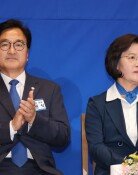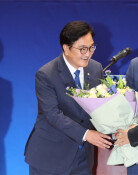The potential of the Kor-US FTA
The Korea-U.S. free trade agreement takes effect Thursday. Korea has entered a new era that can prove wrong the farfetched claims made by those who opposed the effectuation of the accord by hiding their anti-American sentiment. The trade agreement will improve Korea`s trade balance, create jobs, cut prices and boost consumer convenience. In addition, it should prove in a concrete manner that Korea has grown more competitive than its Asian rivals such as China and Japan, which have yet to seal free trade agreements with the U.S., in trading with the world`s largest economy. To do so, the Korean government and businesses must improve on their insufficient preparation to maximize the benefits of the accord.
The global purchasing manager of the top U.S. drugstore chain Walgreens will visit Korea next month to seal deals with Korean suppliers. Purchasing managers of the largest U.S. home shopping channel QVC, large-scale retailers such as Costco, and five global fashion brands such as Ralph Lauren will also come to Korea in June. Through the arrangement of the Korea Trade-Investment Promotion Agency, a host of other global companies will visit Korea to seek purchasing agreements.
The effectuation of the accord has removed trade tariffs with the U.S., which accounts for 23 percent of global GDP. Therefore, Korean exports to the U.S., GDP and jobs will grow. Korean consumers will also benefit from the elimination of tariffs on 9,061 American products as the agreement will cut the prices of wine, fruit, clothing and bags. American carmakers have cut the prices of their cars between 1 million and 2 million won (890 to 1,780 U.S. dollars) in the Korean market. Korean exporters will benefit in the American market as tariffs on their goods have been lifted. Small and mid-size Korean companies should utilize the regulation on place of origin to benefit from the accord. Regulations on place of origin differ depending on each trading partner such as the U.S., the European Union, the Association of Southeast Asian Nations and India, four entities with which Korea has sealed free trade agreements. Small and mid-size Korean companies should deal with the regulations through computer systems. The Korea Customs Service provides customized counseling on free trade deals and runs customs assistance centers around the clock.
Kim Jeong-ho, a researcher at the Korea Rural Economic Institute, said, This is an opportunity for Korean agriculture to make inroads into overseas markets and break from the saturated domestic market. Pear growers in Asan, South Chungcheong Province, and growers of new cluster mushrooms in Anseong, Gyeonggi Province, which have entered the U.S. West Coast and seek to advance into the East Coast, have apparently decided to take a leap forward. Customs clearance procedures that had taken as long as five days have been cut to less than 48 hours. A number of customs charges worth 80 million dollars a year have also been eliminated. These are further effects of the Korea-U.S. free trade accord.
The Korea Trade-Investment Promotion Agency said, U.S. and Japanese companies began showing keen interest in investment in Korea shortly before the effectuation of the accord. U.S. makers of car parts are considering relocating their factories from China to Korea. Japanese machine tool manufacturers will begin construction of their plants in Korea`s fourth-biggest city of Daegu within this month. More foreign investment creates jobs. At a time when a record 56,000 youths in their 20s and 30s were jobless last month, every job counts for Korea.
Choi Won-mok, a professor at Ewha Womans University in Seoul, stressed that Korea should improve its economic fundamentals and conduct restructuring through the accord. Domestic reform such as an overhaul of the service sector, which the government has dragged its feet on, should be pursued together. How to turn the accord into an opportunity to boost productivity depends on Korea`s efforts. The government also said, Boosting the efficiency and competitiveness of the service industry from a long-term perspective through the Korea-U.S. free trade agreement is more important than expanding the American market, adding, By incorporating U.S. investment and technology, we can create jobs in the healthcare, legal, education and accounting industries.
With American law firms entering Korea in sync with the phased opening of the Korean legal market, the domestic service sector will witness a big bang. Related industries are advised to raise their competitiveness in line with market opening instead of seeking to erect crumbling entry barriers in each industry again. Those opposed to the accord are posting groundless rumors that no longer draw public attention on social networking sites. After its proposal to scrap the accord backfired, the main opposition Democratic United Party has lowered the level of its claim to "outright opposition" and another renegotiation. The investor-state dispute system, which opponents of the accord raised to object to ratification, is included in thousands of similar agreements around the world and was even contained in accords Korea concluded in the past. Their opposition simply lies in anti-American sentiment. The investor-state dispute system can in turn ensure Korean investment abroad.
The free trade deal will also strengthen the bilateral alliance. Jeffrey Schott, a senior fellow at the Peterson Institute for International Economics, said the U.S. has declared with the accord that it is deeply involved in South Korea and East Asia, adding that the U.S. has sent a stern signal to North Korea, which wants to deal just with Washington while alienating Seoul. Lee Joon-kyu, head of the Institute of Foreign Affairs and National Security in Seoul, said, Adding another axis of the (South) Korea-U.S. FTA to an axis of the military alliance in 59 years, bilateral relations can now stand on their own two feet.
The accord will serve as a springboard for South Korea to bring about an era of per capita income of 30,000 dollars. It will also energize the Korean economy, whose growth engines and potential have weakened. The South Korean government, businesses and people should unite to march on the road to make their country a free trade powerhouse.







